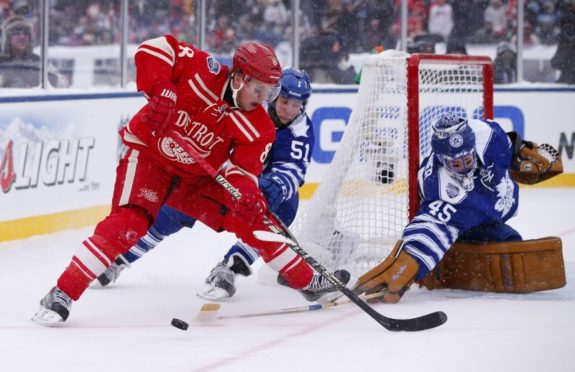After winning their fifth Super Bowl on Sunday, the New England Patriots have shown they are the epitome of a model franchise. They win, and they win a lot. Since 2001, their dynasty includes 14 playoff appearances, 14 AFC East titles and seven AFC Championships.
Cheating allegations aside, any franchise would love to have the success they have had for the past 16 years.
The Hockey News’ Sean McIndoe suggested some lessons NHL teams could learn from the Patriots, and the lesson on loyalty is something the Detroit Red Wings should adhere to.
Loyalty Is for Losers
There is no loyalty when it comes to the Patriots. If you aren’t playing your position good enough, they will find someone who can, even if you’ve helped the team win a championship in the past. Case in point: Joe Vellano.
Before the final preseason game this past season, the Patriots cut the defensive lineman, who lost his house in a fire two days beforehand. Vellano played a combined 21 games for the Patriots in 2013 and 2014, winning a Super Bowl ring, and then spent time on the practice squad in 2015. It didn’t matter Vellano helped them win a championship. The NFL is a cutthroat business, and the Patriots know they need to do whatever it takes to win, even if it means cutting a player who just lost his house.
The Red Wings, namely general manager Ken Holland, are loyal to a fault. In the summer of 2013, the Red Wings signed Daniel Cleary to a one-year deal, even though they had a plethora of young forwards ready to take the next step.
However, Cleary turned down previous contract offers from the Red Wings and verbally agreed to sign with the Philadelphia Flyers for three years at $8.25 million. But then-coach Mike Babcock convinced Cleary to return to the Red Wings, and he said he would take less money with Detroit under the agreement the Red Wings took care of him the next summer in 2014.
So, the Red Wings signed him in 2013 and signed him to another one-year deal in 2014, per their verbal agreement.
You could make the argument the Red Wings are an organization that cares about its players and that is refreshing to see in the cutthroat business of professional sports. However, it doesn’t help the team win, and ultimately, that’s what every team is trying to do. Signing Cleary meant a roster spot wasn’t open for a prospect, such as Teemu Pulkkinen or Andrej Nestrasil, which stunted their development.
Misplaced Loyalty

In addition to Cleary, the Red Wings have shown loyalty to a number of players they shouldn’t have. In November 2015, the Red Wings extended Justin Abdelkader’s contract to seven years at $4.25 million. At 28 years old when he signed the extension, Abdelkader will be 36 years old when his contract expires in 2023.
Abdelkader is a solid fourth- or third-line player, but he certainly isn’t worth $4.25 million for the next seven years. But Abdelkader helped the team reach the Stanley Cup Final in 2009 and has been rewarded for it, despite not being an integral part of the run.
Darren Helm signed a five-year extension worth $3.85 million this past summer. Again, Helm is a solid player, a little more valuable than Abdelkader, but he certainly is not worth five more years, which will keep him in Detroit until he is 35.
Luke Glendening also signed an extension this past summer, four years at $1.8 million. Glendening also isn’t worth that kind of money and term for the player he is, which is a fringe fourth-line player.
It’s loyalty to average and sub-average players that has hurt the Red Wings and is keeping prospects in the AHL for far too long. Detroit would be better served copying the Patriots and doing away with business decisions involving loyalty, maybe not to the extent of releasing a player after his house burns down, but certainly, if there are better and cheaper players available.